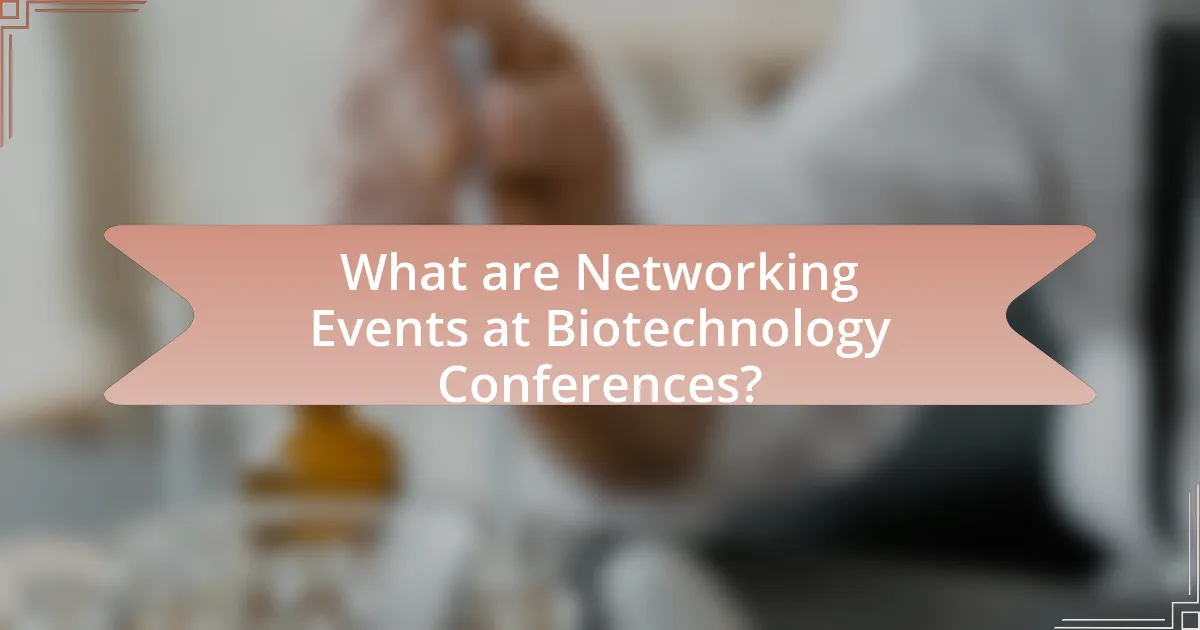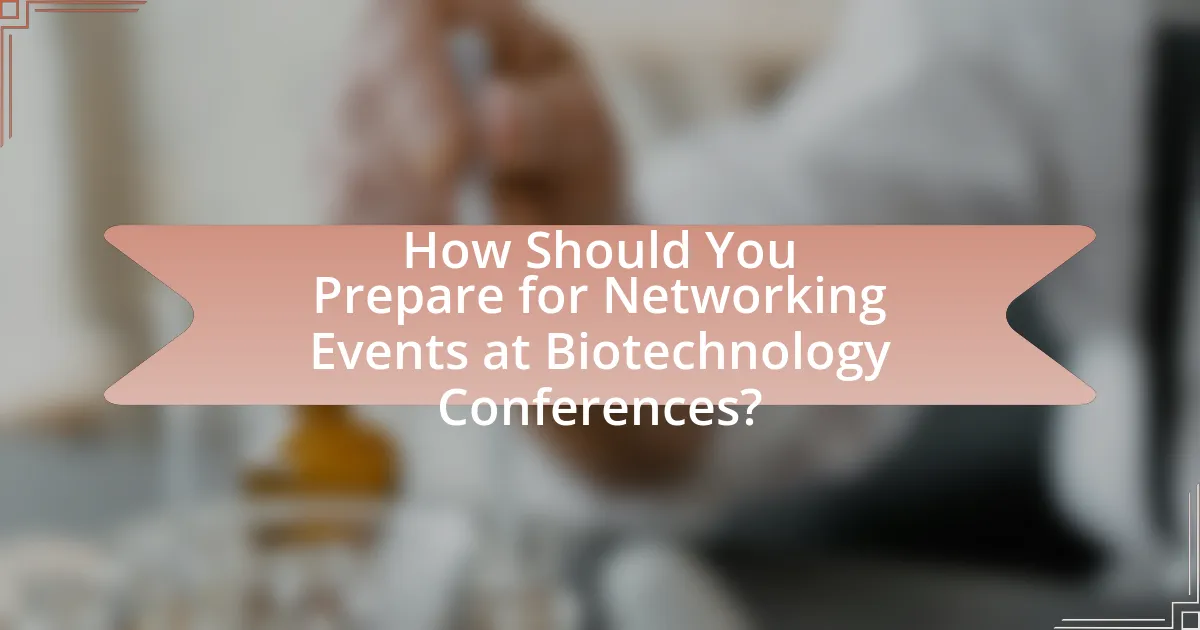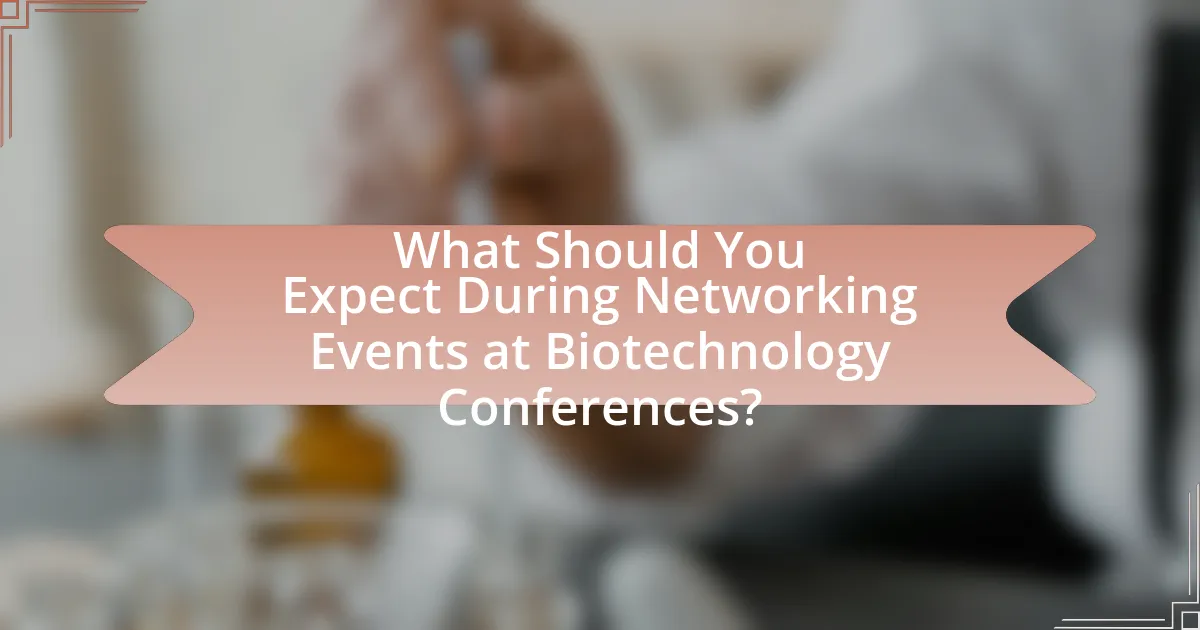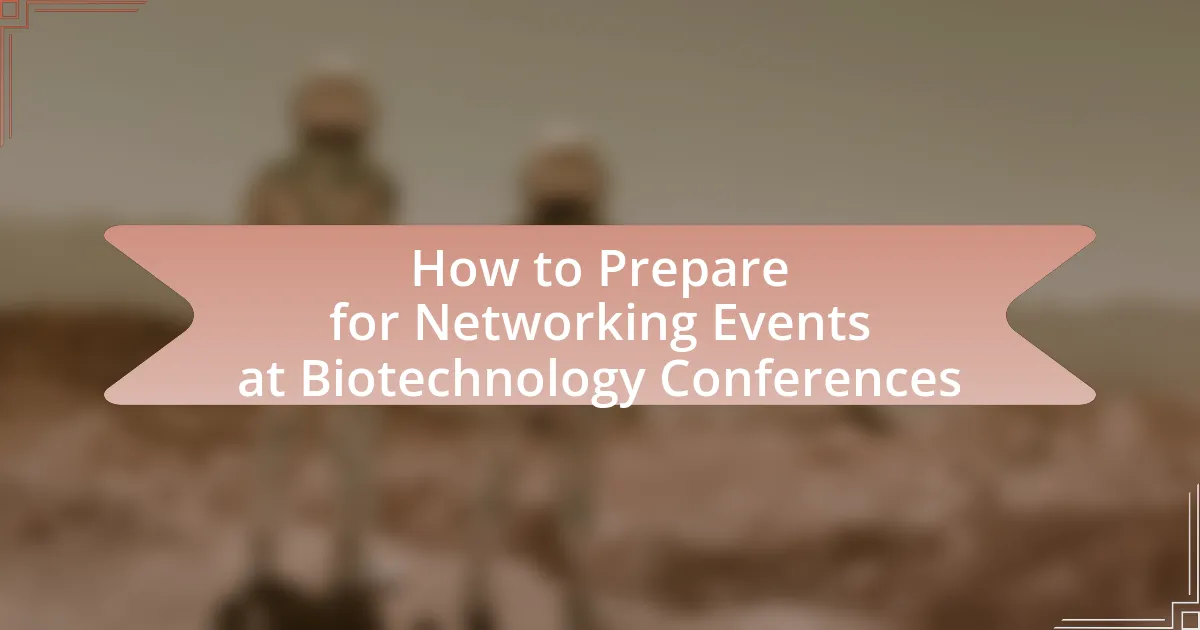Networking events at biotechnology conferences are essential gatherings that facilitate professional connections among researchers, industry professionals, and investors. These structured events include activities such as panel discussions, informal meet-and-greets, and dedicated networking sessions, which promote collaboration and knowledge exchange. The article outlines the significance of these events in career advancement, the types of networking opportunities available, and effective preparation strategies for attendees. It emphasizes the importance of setting specific networking goals, engaging in meaningful conversations, and following up with contacts to maximize the benefits of networking in the biotechnology sector.

What are Networking Events at Biotechnology Conferences?
Networking events at biotechnology conferences are structured gatherings designed to facilitate professional connections among attendees, including researchers, industry professionals, and investors. These events typically include activities such as informal meet-and-greets, panel discussions, and dedicated networking sessions, allowing participants to share ideas, discuss collaborations, and explore business opportunities. The importance of networking events is underscored by the fact that over 70% of jobs in the biotechnology sector are filled through networking, highlighting their role in career advancement and industry engagement.
Why are Networking Events Important in the Biotechnology Field?
Networking events are important in the biotechnology field because they facilitate collaboration, knowledge exchange, and relationship building among professionals. These events provide opportunities for researchers, industry leaders, and investors to connect, share insights on emerging trends, and discuss potential partnerships. For instance, a study published in the journal “Nature Biotechnology” highlights that networking can lead to increased funding opportunities and accelerated innovation by fostering connections that might not occur in isolated environments. Additionally, networking events often feature presentations and discussions that keep attendees informed about the latest advancements and regulatory changes in biotechnology, further enhancing their professional development and industry engagement.
What opportunities do networking events provide for professionals?
Networking events provide professionals with opportunities to build relationships, exchange knowledge, and discover potential collaborations. These events facilitate direct interactions with industry peers, allowing professionals to expand their networks and gain insights into current trends and innovations. According to a study by the Harvard Business Review, 70% of jobs are found through networking, highlighting the importance of these events in career advancement. Additionally, networking events often feature expert speakers and panel discussions, providing attendees with valuable information that can enhance their professional development.
How can networking impact career advancement in biotechnology?
Networking significantly impacts career advancement in biotechnology by facilitating connections that can lead to job opportunities, collaborations, and mentorship. Engaging with industry professionals at conferences allows individuals to showcase their skills and knowledge, which can result in referrals or recommendations for positions. According to a survey by LinkedIn, 85% of jobs are filled through networking, highlighting its critical role in career progression. Additionally, networking can provide access to the latest industry trends and innovations, enhancing an individual’s expertise and marketability in the biotechnology field.
What Types of Networking Events Can You Expect at Biotechnology Conferences?
At biotechnology conferences, you can expect various types of networking events, including panel discussions, poster sessions, roundtable discussions, and informal meet-and-greet sessions. Panel discussions typically feature experts sharing insights on current trends, allowing attendees to engage with speakers and ask questions. Poster sessions provide a platform for researchers to present their work, facilitating one-on-one interactions with interested peers. Roundtable discussions encourage in-depth conversations on specific topics, fostering collaboration among participants. Informal meet-and-greet sessions create relaxed environments for attendees to connect and build relationships. These formats are designed to enhance professional networking and collaboration within the biotechnology field.
What are the differences between formal and informal networking events?
Formal networking events are structured gatherings with specific agendas, often featuring presentations or panel discussions, while informal networking events are casual meetups that encourage spontaneous interactions. Formal events typically require registration and may have a dress code, whereas informal events often take place in relaxed settings, such as cafes or social gatherings, without strict guidelines. The purpose of formal networking is usually to facilitate professional connections within a defined context, such as industry conferences, while informal networking aims to build relationships in a more relaxed atmosphere, allowing for organic conversations.
How do panel discussions and workshops facilitate networking?
Panel discussions and workshops facilitate networking by creating structured environments where participants can engage in meaningful conversations and share insights. These formats encourage interaction among attendees, allowing them to connect over shared interests and expertise. For instance, panel discussions often include Q&A sessions that prompt audience members to ask questions, fostering dialogue and relationship-building. Workshops typically involve collaborative activities, which require participants to work together, enhancing rapport and networking opportunities. Research indicates that 70% of professionals find networking at events like these to be effective for building connections, as they provide a platform for direct engagement and knowledge exchange.

How Should You Prepare for Networking Events at Biotechnology Conferences?
To prepare for networking events at biotechnology conferences, individuals should research attendees and speakers in advance. This preparation allows for informed conversations and targeted networking opportunities. Additionally, creating a concise personal pitch that highlights relevant experience and interests can facilitate meaningful interactions. Organizing business cards and ensuring a professional online presence, such as an updated LinkedIn profile, further enhances networking effectiveness. According to a study by the National Center for Biotechnology Information, effective networking can lead to collaborative opportunities and career advancements in the biotechnology field.
What Steps Should You Take Before the Conference?
Before the conference, you should conduct thorough research on the event, including the agenda, speakers, and attendees. This preparation allows you to identify key individuals and sessions relevant to your interests and goals. Additionally, creating a networking strategy, such as setting specific objectives for whom to meet and what to discuss, enhances your effectiveness during the event. Organizing your materials, such as business cards and a digital portfolio, ensures you are ready to engage with others. Finally, practicing your elevator pitch helps you communicate your professional background succinctly and effectively.
How can you research attendees and speakers in advance?
To research attendees and speakers in advance, utilize online platforms such as LinkedIn, conference websites, and social media to gather information. LinkedIn allows you to view professional profiles, connections, and shared interests, which can help identify potential networking opportunities. Conference websites typically provide lists of speakers along with their bios, highlighting their expertise and affiliations, which aids in understanding their backgrounds and relevance to your interests. Additionally, social media platforms can reveal insights into speakers’ recent activities, publications, and discussions, further informing your approach. This method is effective as it leverages publicly available information to create a comprehensive understanding of the individuals involved in the event.
What materials should you prepare for effective networking?
To prepare for effective networking at biotechnology conferences, you should have business cards, a personal elevator pitch, and relevant informational materials. Business cards facilitate easy exchange of contact information, ensuring that connections can be followed up on after the event. A personal elevator pitch succinctly communicates your professional background and interests, making it easier to engage in meaningful conversations. Relevant informational materials, such as brochures or research summaries, provide tangible evidence of your work and expertise, enhancing your credibility during discussions. These materials collectively support effective networking by enabling clear communication and fostering lasting connections.
How Can You Enhance Your Networking Skills?
To enhance your networking skills, actively engage in conversations and practice effective communication techniques. Engaging in conversations allows you to build rapport and establish connections, while effective communication techniques, such as active listening and clear articulation of your ideas, facilitate meaningful interactions. Research indicates that individuals who practice active listening can improve their networking outcomes by 50%, as they are better able to understand and respond to others’ needs. Additionally, attending workshops or seminars focused on networking can provide practical strategies and boost confidence, further enhancing your ability to connect with others in professional settings.
What strategies can you use to initiate conversations?
To initiate conversations effectively at biotechnology conferences, employ strategies such as asking open-ended questions, sharing relevant experiences, and utilizing situational observations. Open-ended questions encourage detailed responses, fostering deeper dialogue; for instance, asking, “What recent advancements in biotechnology excite you?” can lead to engaging discussions. Sharing personal experiences related to the field can create common ground and establish rapport, as attendees often appreciate relatable stories. Additionally, making observations about the conference environment, such as commenting on a presentation or the venue, can serve as a natural conversation starter. These strategies are supported by research indicating that effective networking relies on the ability to engage others meaningfully, as highlighted in studies on interpersonal communication in professional settings.
How can you effectively follow up after meeting new contacts?
To effectively follow up after meeting new contacts, send a personalized email within 24 to 48 hours of the meeting. This prompt communication reinforces the connection and shows your interest in maintaining the relationship. In your email, reference specific topics discussed during your conversation to create a personal touch and remind them of your interaction. According to a study by the Harvard Business Review, timely follow-ups significantly increase the likelihood of establishing a lasting professional relationship.

What Should You Expect During Networking Events at Biotechnology Conferences?
During networking events at biotechnology conferences, you should expect opportunities to connect with industry professionals, researchers, and potential collaborators. These events typically feature structured activities such as panel discussions, roundtable sessions, and informal meet-and-greets, allowing attendees to share insights and explore partnerships. According to a survey by the Biotechnology Innovation Organization, 85% of attendees find networking to be a key benefit of participating in such conferences, highlighting the importance of building professional relationships in the biotechnology sector.
How Can You Make a Positive Impression on Others?
To make a positive impression on others, actively engage in meaningful conversations and demonstrate genuine interest in their perspectives. This can be achieved by maintaining eye contact, listening attentively, and asking thoughtful questions that show you value their input. Research indicates that effective communication skills, such as active listening and empathy, significantly enhance interpersonal relationships and networking success. For instance, a study published in the Journal of Business and Psychology found that individuals who exhibit strong interpersonal skills are perceived as more likable and trustworthy, which directly contributes to forming positive impressions.
What role does body language play in networking?
Body language plays a crucial role in networking by conveying confidence, openness, and engagement, which are essential for building professional relationships. Effective body language, such as maintaining eye contact, using appropriate gestures, and adopting an open posture, can significantly enhance communication and make interactions more memorable. Research indicates that nonverbal cues account for a substantial portion of interpersonal communication, with studies showing that up to 93% of communication effectiveness is determined by nonverbal signals, including body language. This underscores the importance of being aware of one’s body language during networking events, particularly in fields like biotechnology, where establishing trust and rapport can lead to valuable collaborations and opportunities.
How can you tailor your elevator pitch for different audiences?
To tailor your elevator pitch for different audiences, identify the specific interests and needs of each audience segment. For instance, when addressing investors, emphasize potential returns and market opportunities, while for scientific peers, focus on research methodologies and innovations. This approach ensures relevance and engagement, as evidenced by a study from the Harvard Business Review, which found that personalized communication increases listener retention by 50%. By aligning your pitch content with the audience’s priorities, you enhance the effectiveness of your message.
What Common Challenges Might You Face at Networking Events?
Common challenges at networking events include difficulty initiating conversations, overcoming social anxiety, and managing time effectively. Many attendees struggle to approach strangers, which can hinder networking opportunities. Social anxiety can lead to avoidance of interactions, reducing the potential for valuable connections. Additionally, with numerous attendees and limited time, individuals may find it challenging to prioritize whom to engage with, potentially missing key contacts. According to a study by the American Psychological Association, about 20% of adults experience social anxiety, highlighting the prevalence of this challenge in networking scenarios.
How can you overcome shyness or anxiety in networking situations?
To overcome shyness or anxiety in networking situations, individuals can practice preparation techniques such as role-playing conversations and setting specific networking goals. Engaging in these activities helps build confidence and reduces anxiety by familiarizing oneself with potential interactions. Research indicates that practicing social skills can significantly improve comfort levels in networking scenarios, as demonstrated in a study published in the Journal of Social Psychology, which found that individuals who practiced social interactions reported lower anxiety levels and increased self-efficacy.
What should you do if conversations stall or feel awkward?
If conversations stall or feel awkward, you should initiate a change in topic or ask open-ended questions to re-engage the other person. This approach encourages dialogue and can help alleviate tension. For instance, asking about recent developments in biotechnology or their experiences at the conference can provide a fresh direction for the conversation. Research indicates that open-ended questions foster deeper discussions and can significantly improve interpersonal interactions in networking settings.
What Are Some Best Practices for Successful Networking?
Successful networking involves building genuine relationships, actively listening, and following up with contacts. Establishing a personal connection is crucial; research shows that 85% of jobs are filled through networking, highlighting its importance in professional growth. Engaging in meaningful conversations and showing interest in others fosters trust and rapport. Additionally, following up within 24-48 hours after meeting someone reinforces the connection and increases the likelihood of future interactions. These practices are essential for effective networking, particularly in specialized fields like biotechnology, where collaboration can lead to significant advancements.
How can you maintain connections after the event?
To maintain connections after the event, follow up with personalized messages to the individuals you met. This can include sending a thank-you email or a LinkedIn connection request that references your conversation, which reinforces the relationship. Research indicates that timely follow-ups, ideally within 24 to 48 hours post-event, significantly increase the likelihood of maintaining connections, as noted in studies on networking effectiveness. Additionally, engaging with their content on social media and scheduling future meetings can further solidify these connections.
What tools can help you manage your networking contacts effectively?
Tools that can help manage networking contacts effectively include customer relationship management (CRM) software, contact management apps, and networking platforms. CRM software like Salesforce or HubSpot allows users to organize and track interactions with contacts, providing insights into relationship history and follow-up reminders. Contact management apps such as CamCard or Contacts+ enable users to scan business cards and store contact information efficiently, while also offering features for categorizing and tagging contacts. Networking platforms like LinkedIn facilitate connections and maintain professional relationships by providing tools for messaging, endorsements, and updates on industry news. These tools enhance organization and communication, making it easier to nurture professional relationships in the biotechnology sector.
What Tips Can Help You Maximize Your Networking Experience?
To maximize your networking experience at biotechnology conferences, actively engage with attendees by initiating conversations and asking insightful questions. This approach fosters meaningful connections and demonstrates genuine interest in others’ work. Research indicates that effective networking can lead to collaborative opportunities, as highlighted in a study by the Harvard Business Review, which found that 70% of jobs are obtained through networking. Additionally, following up with new contacts after the event solidifies relationships and opens doors for future interactions.
How can you set specific goals for your networking efforts?
To set specific goals for your networking efforts, identify clear objectives such as establishing a certain number of new connections, scheduling follow-up meetings, or gaining insights into specific industry trends. For instance, aiming to connect with at least five professionals in your field during a biotechnology conference provides a measurable target. Research indicates that networking can significantly enhance career opportunities; a study by the Harvard Business Review found that 70% of jobs are found through networking. This underscores the importance of having defined goals to maximize the effectiveness of your networking activities.
What are the key takeaways to remember for future networking events?
Key takeaways for future networking events include preparing an elevator pitch, researching attendees, and following up after the event. An elevator pitch succinctly communicates your background and goals, making it easier to engage with others. Researching attendees allows for targeted conversations, increasing the likelihood of meaningful connections. Following up with contacts reinforces relationships and can lead to future opportunities, as studies show that consistent follow-up can enhance networking effectiveness by up to 70%.


